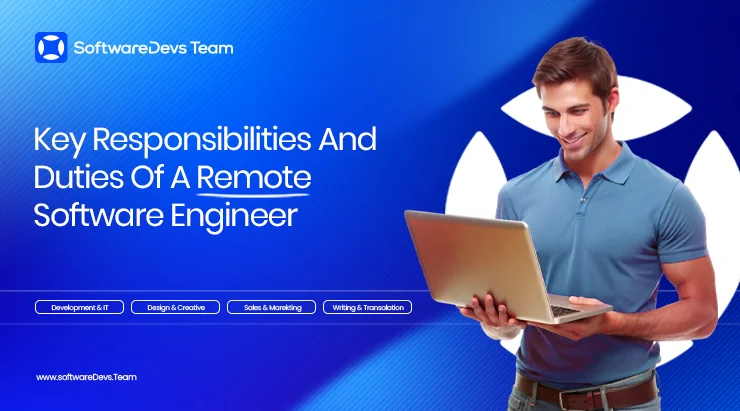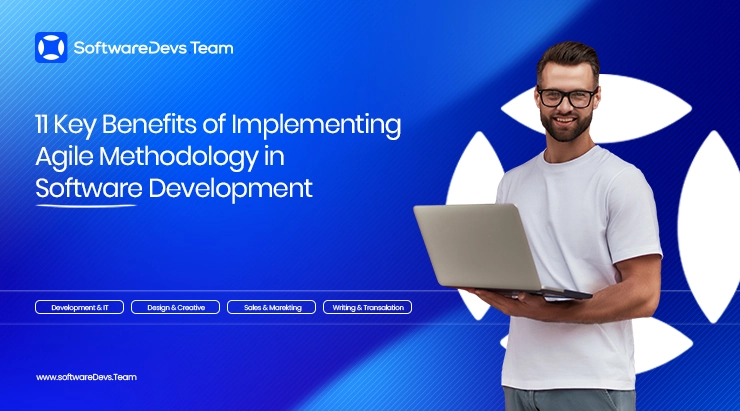In the fast-paced digital world, there are now new strategies for dealing with things. Digital developments have made a hundred different ways to handle a single problem. Likewise, the working dynamics have also evolved. Typical employment methods have now advanced to new levels. Remote work culture has greatly been adopted worldwide. Many companies are now hiring remote employees. This is because of the benefits that come with hiring remote employees. However, remote work also has challenges. Data security is the biggest one. With the rising data breaches, both the employee and company data demands to be made secure. Therefore, it is important to ensure data security when adopting the remote work culture.
Remote Software Engineering: A Popular Field
Remote work culture has proven to be beneficial for all industries. But the tech industry has taken the most benefit from it. Due to most procedures operating online, remote work is popular in this field. From simple coding to app development, everything is done by software. This is why most companies prefer to hire tech talent remotely. By doing this, they enable their reach to global expertise. Remote software engineering is in high demand these days. This is due to the flexibility and agility it offers in software development. There are a lot of remote software engineers working worldwide. Every business hires them for its digital growth and technical strength.
Data Security: A Major Challenge in Remote Software Engineering
As we always see, every technology has its pros and cons. Likewise, hiring remote software engineers has its benefits and challenges. These are linked to both employees and the company. The major challenge is maintaining data security when working with remote software engineers. This affects both parties. The number of cyber-attacks and data breaches continues to rise. Data breaches cause client distrust and a negative brand image. Companies have to ensure cyber security for their remote teams. This is crucial for protecting their client data and software project confidentiality. Likewise, data security is a major concern for the other party too. They have to ensure secure data encryption from their side. They have to keep all data accessible only to concerned parties. This can be done in many ways.
This blog will explore the best ways to ensure data security when working with remote software engineers. But let’s first see what causes data breaches.
How do Remote Software Engineers cause Data Breaches?
Remote software engineers unintentionally contribute to data breaches in many ways. Some of these are:
1. Inadequate Security Measures
The lack of proper security measures is the major cause of cyber attacks. Software engineers often make typical mistakes. Having a lot of accounts to manage and work on. They use the same or similar passwords for each account. They do it to avoid forgetting login credentials. If hackers access one password, they get access to all accounts automatically. Likewise, generic or weak passwords are also a major cause. Hackers can guess or crack them using password-cracking tools. Moreover, software engineers unwittingly allow data breaches by postponing software updates. Cyber attackers can easily crack outdated or older software. All mistakes can lead to data breaches.
2. Unsecured Wi-Fi Networks
Remote software engineers often use public Wi-Fi networks. This is because they work in different places. Doing this makes sensitive user data prone to theft and breaches. Sending and receiving data through these networks compromises data security. Stolen data can then be used for fraud, impersonation, or business defamation. This data includes passwords, login credentials, IP addresses, etc.
3. Lack of Data Recovery Plans
Improper data recovery plans can lead to data loss or theft. Companies or clients can lose their confidential data easily through this. Using inefficient data backup methods can cause delays in data recovery. Likewise, unsecured data recovery sources can also cause data breaches.
4. Social Engineering Attacks
Social engineering attacks involve using psychological tactics for data theft. It is caused by human error rather than software fault. Cybercriminals manipulate users to give away sensitive information about data. They mentally engage them in these conversations and trap them. After getting the required information, they cover their tracks and disappear. The user is left with questions only.
Social engineering attacks can be conducted in the following ways:
- Baiting (Stealing data through malicious hardware)
- Phishing (Data breaching done through scam texts and emails)
- Scareware (Data theft done through false alarms and software virus threats)
- Pretexting (Obtaining sensitive data through impersonation of police officers, health workers, etc)
Best Tips to Ensure Data Security while Working with Remote Software Engineers
The following tips can ensure data security when working with remote software engineers:
Train Remote Software Engineers for Data Security
Data security can be ensured by providing regular training to remote software engineers. They should be made aware of the latest secure systems and practices. They should be trained in different data protection techniques. Companies should teach them about using virtual private networks (VPNs). These networks ensure data encryption between the company and remote employees. Multi-factor authentication is also important for data security. Remote software engineers should know how to use it. Moreover, they should be trained for risk management and other security measures.
Monitor and Control Data Access
Companies should limit data access to remote software engineers. Each employee should be given access limited to his/her job requirements. Data access to important systems, apps, etc should be restricted. This ensures data protection and prevents unauthorized access. RBAC is a popular data security practice. Role-Based Access Controls give data access based on job positions.
These methods can ensure data security when working with remote software engineers.
Secure Remote Access
Secure networks should be used when providing company data to remote employees. Remote desktop protocols and VPNs make this easier. These networks use data encryption to transfer it to the employee’s devices. This is a secure pathway for data that prevents data losses. During data transference, outsiders can’t access it as the data is encoded/encrypted. Secure encryption enables only authorized data access.
Use NDAs
NDA stands for non disclosure agreement. It is a legal contract signed between employees and the company. It ensures confidentiality between both parties. By signing this, employees agree to protect the company’s sensitive data. NDAs come with specific compliance regulations that are to be strictly followed.
NDAs are important for data security when working with remote software engineers. Its legal status ensures no violation of data privacy rules.
Conduct Regular Security Audits
Having regular security audits can ensure data security when working with remote teams. They help evaluate and monitor security protocols applied in the company. They can help identify and fix errors or weaknesses in these protocols. Security audits also ensure compliance with industry rules and practices.
Wrapping up
Ensuring data security is crucial when working with remote software engineers. Data leaks cause serious damage to organizations. They can cause financial fraud as well as identity theft. Companies should take firm measures to protect their confidential data. They should also ensure their remote teams use secure connections, devices, and pathways. This practice should be made compulsory while working. Strong data security systems are pivotal in a brand’s stability and success.
SoftwareDevs.Team provides the best remote software engineers from all corners of the world. Your data security and privacy is our top priority. Hence, we ensure to do extensive background checks while hiring our remote software engineers. Our team is based on highly skilled engineers. Moreover, our experts are fully trained and equipped for top data security protocols. Get the best remote software engineers for your business according to your time zone with us.
FAQs
How do you protect and secure data while working remotely?
Securing data while working remotely can be done in many ways such as:
- Using VPNs and remote desktop protocols for secure connections
- Using data encryption
- Keeping software and devices updated
- Avoiding unsecured Wi-Fi networks
How do you ensure data security for software?
Data security for software can be ensured by:
- Following secure coding practices
- Managing access and authorization
- Encrypting sensitive data
- Regular software testing
How do you ensure data security when outsourcing?
It can be done by:
- Conducting regular security audits
- Restricting access
- Implementing data protection agreements
- Complying with data privacy laws
How do I ensure secure remote access?
Securing remote access can be done by using secured networks and device protocols. Using VPNs is a great measure to secure remote access to data. It uses data encryption which protects sensitive data against thefts and breaches.
What are the security measures for remote working?
Remote workers should follow these security measures at all times:
- Creating strong passwords
- Regularly updating devices and software
- Never leaving devices unattended
- Using secure connections and networks
- Watching out for social engineering attacks
How can you avoid data loss while working remotely?
- Use strong passwords
- Encrypt your data
- Keep your devices and software updated
- Follow data privacy policies
- Avoid using public wifi
- Using proper recovery plans
How do you keep data secure and protected?
Data can be secured and protected using data security protocols. Using secured networks, data recovery plans, data encryption etc, can help keep data secured.




